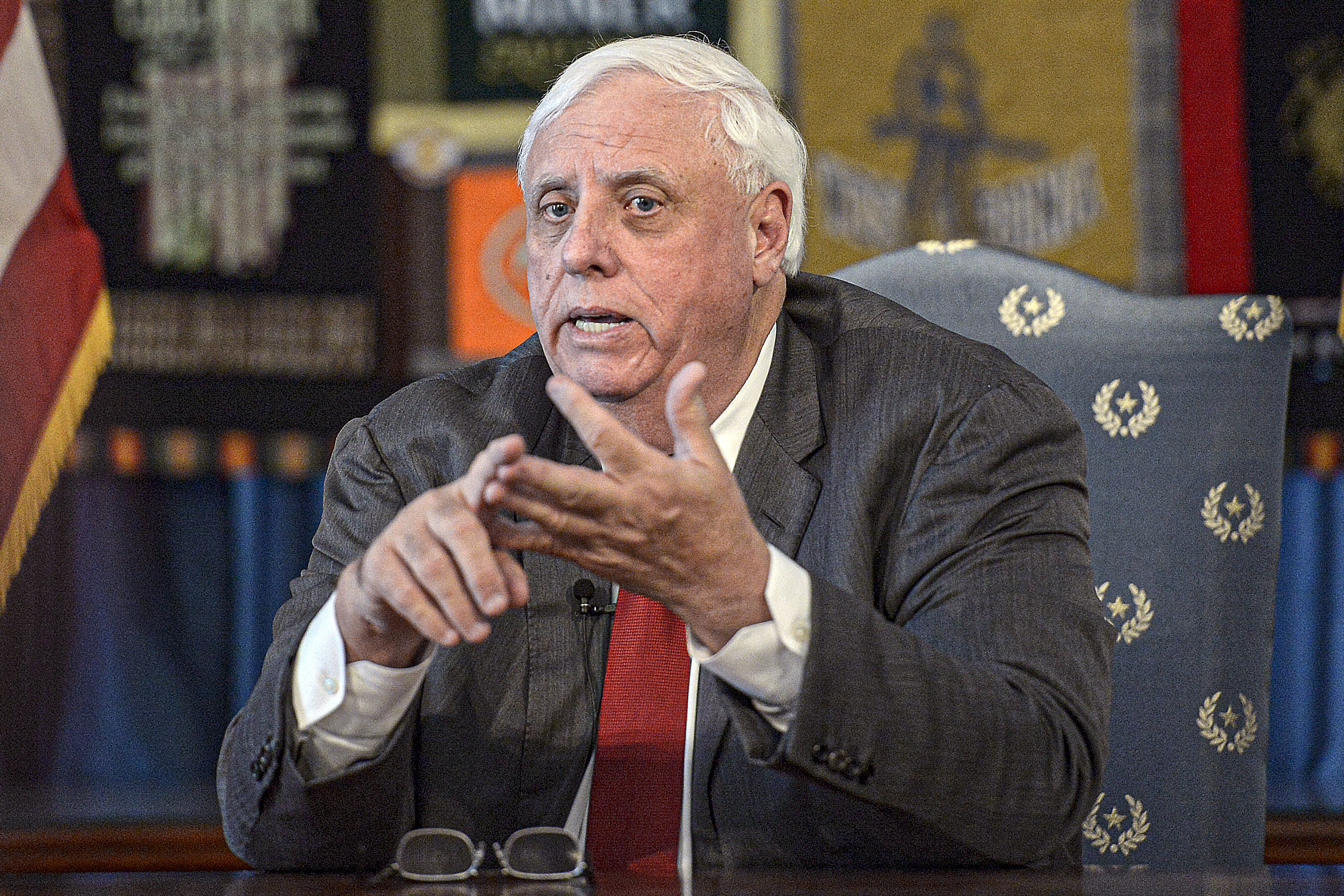
If lawmakers from three GOP-leaning counties in Western Maryland had their way, their counties would become part of West Virginia — and the state’s governor said he would welcome them with “open arms.”
“We’d welcome absolutely these counties and be tickled to death to have them and the great folks of that incredible state,” West Virginia Gov. Jim Justice said during a virtual briefing on Friday, struggling to pronounce Garrett County, one of the three Maryland counties hoping to secede.
The governor’s response came after a group of lawmakers representing Garrett, Allegany and Washington counties sent two letters last week asking West Virginia officials to consider adding their counties to the state.
The first letter — for Garrett and Allegany counties — was signed by Sen. George Edwards and Dels. Wendell Beitzel, Jason Buckel and Mike McKay. The second letter — for Washington County — was signed by Del. William Wivell as well as McKay.
Not surprisingly, all of the lawmakers are Republicans and thus outliers in a state dominated by Democrats. Although Maryland Gov. Larry Hogan is a Republican, Democrats hold a supermajority in the state legislature and have voted for a Democratic president in every election since 1992.
Justice said he wasn’t surprised the three counties would want to join his state because “we got it going on in West Virginia right now and that’s all there is to it.”
But that’s not all there is to it. The only hitch with the lawmakers’ ask? It probably won’t happen — unless, by some miracle, legislatures in both states approve it, along with Congress — which is what the U.S. Constitution would require.
And good luck getting the Democratic-controlled legislature in Maryland to be fine with giving up a large chunk of population and territory.
Some Democrats in Maryland dismissed the letters as a publicity stunt.
“Congratulating my colleagues on this attention-seeking effort! But remember, viral relevance is but a vapor,” Del. Stephanie M. Smith (D-Baltimore City) said in a tweet. “You’ll still be a Maryland resident after the re-tweets subside & the side eyes will be abundant.”
Hogan had a similar response, telling the Baltimore Sun: “I think it’s really just a game for attention. … I think it was a publicity stunt that worked well because you guys are going to ask about it. But it’s not really going to happen.”
But if the letters were meant to generate publicity, they certainly worked.
Justice said he felt compelled to respond to the letters because “when the national news starts calling like crazy … then we’ve got to step and comment.”
And the governor seemed more than happy to comment on all that his state has to offer.
“I don’t say this in a braggadocious way at all but … why in the world would you not want to come here?” he said, citing West Virginia’s budget surpluses, a rainy day fund over $1 billion and economic growth.
“Tourism is exploding to the upside in West Virginia. We’ve invested in our education system, giving record pay raises back to back, and that’s for all state employees. Programs that lift our people out of poverty into prosperity,” he added. “Our veterans here live tax-free. There’s no state taxes here now on Social Security for our senior citizens. We have incredible investment going on in our roads. We’ve handled the COVID pandemic the best of any other state in the nation, without any question.”
Some Marylanders, however, might beg to differ on that point.
In Maryland, more than 85% of adults have received at least one dose of the COVID-19 vaccine. After a strong initial vaccine rollout, West Virginia has stalled, with 57% of residents receiving one dose. The most recent seven-day average case positivity rate in Maryland was 3.8%, while West Virginia’s was 10.9%.
Economically, a move to West Virginia may not make much sense either. West Virginia is one of the poorest states in America, with a per-capita GDP of just above $26,000, compared to more than $42,000 in Maryland, according to the U.S. Census. The poverty rate is nearly double, and West Virginia has the lowest life expectancy in the country. On the education front, the percentage of West Virginians with a bachelor’s degree or higher is around 20%, versus 40% in Maryland.
Still, there’s a definite appeal for residents in the three Republican-leaning, rural Maryland counties to switch allegiance to a more conservative state — among them, low taxes and an ideological kinship on hot-button issues such as gun rights, opposition to abortion and pandemic restrictions.
Justice said he will propose the idea of adding the Western Maryland counties as a resolution at the next special assembly.
“There are steps you’ve got to go through, and I understand all that,” the governor said.
“And people may say, ‘Well, you know, this is going to be really, really difficult to do.’ In fact, some people may really regard this as impossible. And I go back to my dad, and my dad always said, ‘Justice … if it’s really, really, really hard, it’s going to probably take a couple days to pull it off. And if some people call it impossible, it’ll take you another couple of days. But absolutely … just keep plowing ahead.”
However, even some of the lawmakers who signed their names to the initial letter that kicked off this bizarre saga have begun backpedaling. Maryland House of Representatives Minority Leader Jason Buckel said he was under the impression the letter would lead to a non-binding referendum for residents of the three Maryland counties to gauge their interest in joining the Mountain State.
In a letter put on Friday, Buckel called the efforts “foolhardy” and criticized lawmakers of trying to move too quick without consulting the people of the counties in question.
“I would not support any legislative efforts or other efforts to attempt to make such a maneuver without a full public referendum of the three counties having previously occurred,” Buckel said in the letter. “I believe, clearly, that we have allowed ourselves to move too far, too fast on this issue, motivated by the political calendar of our counterparts in West Virginia rather than by a prudent strategy.”
Buckel said he and Maryland Sen. George Edwards had spoken about the movement recently, and that both agreed the effort was advancing too quickly for comfort. Further, Buckel asked that his name be removed from any future documents that vouched in favor of moving the three counties to West Virginia.
Whether the effort goes beyond West Virginia remains to be seen. Lawmakers from the three Maryland counties would likely try to hold a referendum on the issue next year to gauge public interest in joining West Virginia. If the prospect receives a positive response, both chambers of the Maryland General Assembly would have to approve the move in a majority vote, followed by a vote in Congress.
There have been similar moves by groups ranging from California to Texas to secede from their states — including a similar push by Western Maryland in 2013 — although none have gained any traction.
So it doesn’t look like Western Maryland will become a member of the Mountain State any time soon, and, for now at least, will have to stick to Old Bay crabs in the Old Line State.








